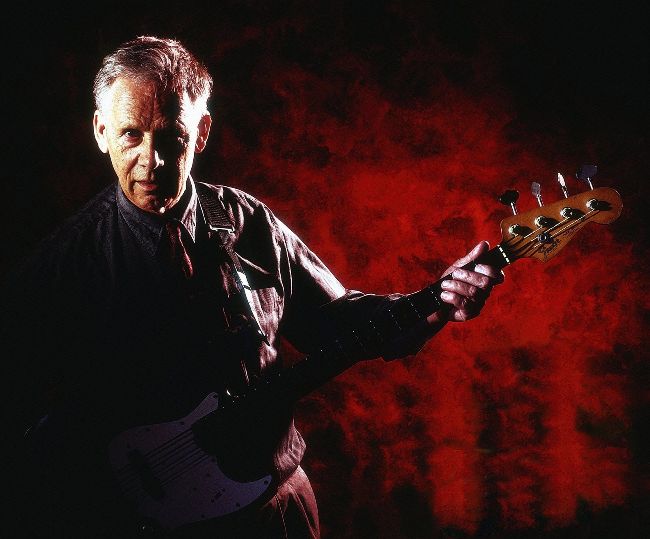REAL GONE
Four Strings Good
Bass master and session legend Herbie Flowers left us on September 5.

Low end theorist: bass maestro Herbie Flowers made musical history.
Ian Harrison
Steve Catlin/Redferns/Getty
HE PLAYED bass lines generations of listeners can recognise in a heartbeat, but session musician Herbie Flowers was no gear fetishist. He said that he’d only ever owned three instruments: a second-hand tuba, an English-made double bass and a Fender Jazz Bass. By such modest means, musical history was made.
Born Brian Flowers in Isleworth on May 19, 1938, he recalled an early encounter with a pair of headphones, and pressing the earpieces close to better hear the low end. He started his national service in the RAF aged 18, where he earned his nickname. He stayed for nine years, playing tuba and then double bass as a bandsman. As a civilian he played jazz and worked on the Queen Elizabeth cruise liner, acquiring an electric bass in New York.
Ingrained punctuality and ability to sight read made him suited to London’s session world, he said, and from the later 1960s he was immersed in it, coming and going from studios each morning and afternoon, with gigs in the evening.
“Two notes! It’s supposed to be legendary but it’s bollocks.”
HERBIE FLOWERS ON WALK ON THE WILD SIDE
What came out of those sessions is bewildering to contemplate, amounting to a secret history and shadow career that’s comparable to names of much greater familiarity. As well as recordings with Bryan Ferry, Cliff Richard, Roger Daltrey, Melanie, Tim Rose, Steve Harley, Camel, Sally Oldfield, Al Kooper, Cat Stevens and all The Beatles except John Lennon, Flowers’ eminent early-’70s credits included Elton John’s Tumbleweed Connection and Madman Across The Water, Serge Gainsbourg’s Histoire De Melody Nelson, Bowie’s self-titled second LP (including 1969’s debut hit Space Oddity) and Diamond Dogs, and Lou Reed’s Transformer. The latter album featured the bassist’s most celebrated creation, the exquisite two-note ascend/ descend that drives Walk On The Wild Side, but his mastery of the instrument stunned just as much on Harry Nilsson’s Jump Into The Fire and Rock On by David Essex, among many others.
As well as doing sessions, Flowers played in bands including C.C.S., the final line-up of T.Rex and Blue Mink, who scored six UK Top 20 singles from 1969 to ’73. In 1978, he co-founded classical rockers Sky with John Williams: active until 1995, the group reached UK Number 1 with 1980’s Sky 2 and Number 5 with its single Toccata. He also appeared on 1978 huge-seller Jeff Wayne’s Musical Version Of The War Of The Worlds, co-wrote Clive Dunn’s 1970 UK Number 1 Grandad and represented the UK at the 1979 Eurovision Song Contest with Mr Moonlight, one of numerous solo singles which included Tuba Smarties and Don’t Take My Bass Away. Though he’d played on hits including The Scaffold’s Thank U Very Much, Barry Ryan’s Eloise and Tom Jones’s Delilah, he questioned why people needed to know exactly what he’d played on. At a one-man show in Edinburgh in 1998, he memorably reflected on his part in Walk On The Wild Side: “Two notes! It’s supposed to be legendary but it’s bollocks.”
In later years, Flowers played jazz, taught bass and worked with young musicians. In 2005 he reflected on his life in the session age to MOJO’s Phil Sutcliffe, calling it, “an illustrious life, but a ghostly one because I was always working for somebody else… I can’t believe the glory of it all now.”